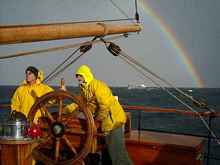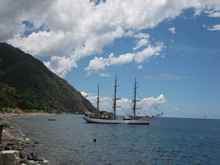|
When we got our new Spot satellite messenger from Chuck at Duckworks
I really had no idea how cool it would be! Just a bit larger than
a pack of cigarettes, but as toys go it has turned out to be a
surprisingly useful and fun little device. So we decided to send
it around the world.
Our son Clark, a history buff with a Masters degree in Maritime
History from the University of Exeter in the UK, had just signed
up for a 14 month round the world trip as a trainee in a tall
ship. The Picton Castle is homeported in the pretty little seacoast
town of Lunenburg Nova Scotia. It’s a steel hulled, riveted
plate 80 year old 179 foot barque, with a lot of cargo-hauling
history under the keel before getting her new makeover rig in
1997. There are five yards on each of the three masts for a total
of 15 squaresails, plus 3 or 4 headsails set from the bowsprit
and a spanker on the mizzen, and some other miscellaneous scraps
of heavy bolted canvas for riding out storm conditions. Captain
Dan Moreland has taken this old windjammer all the way around
four times before, each time with a green crew of trainees, so
this ain’t his first rodeo either! Like the 10 or 12 members
of the paid pro crew say—“he da man!”—but
his level of experience is all quite comforting for friends and
family.
|
Picton Castle under full sail. |
After a tedious month of maintenance slapping paint, loading
stores and cargo and splicing line in the cold wet spring of Lunenburg,
waiting for gear and supplies and a spell of decent weather to
arrive, they sailed off their mooring, ghosted outside and turned
south, bound for the Panama canal. Fair winds should not be wasted
and they went out into an almost ideal NW wind of 10 to 20 knots
and moderate seas—ideal for a nervous green crew--most still
drying out from late night sessions in the popular Grand Banker
Pub overlooking Lunenburg harbor. Alcohol being the universal
anxiety medicine, I know one bartender who’ll likely be
sorry to see those 40-some skittish trainees sail out the harbor.
 |
Great shot of helm with a rainbow in the background. |
The ships cargo hold is full of plastic wrapped bags of cement,
building materials, textbooks, lawnmowers and other gear slated
for drop-offs in Pacific Islands. The ship will spend about a
third of time in port and they have a list of stops that reads
like a travel agents wish list. Galapagos, Pitcairn, Tahiti, Rarotonga,
Tonga, Fiji, Bali, Cape Town, St Helena, Brazil and back to Bermuda
before a due north run back to Lunenburg.
Clark may not have much hands-on sailing experience, but he fished
halibut in Alaska, researched wrecked Cape Horn ships for three
months in the Falkland Islands, and worked at the San Francisco
Maritime Museum and the San Diego Maritime Museum among other
maritime related ventures—so he didn’t just fall off
the turnip truck on the way through town either. Traveling to
the UK, Clark has crossed the Atlantic on Cunard liners Queen
Mary 2 and the Queen Elizabeth. Hes already been to one of their
most exotic and isolated stops in the Atlantic—the island
of St Helena, to see the temporary grave of Napoleon before he
was dug up and relocated to France. Teaching school again may
seem a bit tame after all this—but we should all have these
sorts of problems.
 |
 |
Photos of Clarks bunk, his home for the next 14 months, show
his collection of flashlites, vitamins, books, wet weather gear
and posters of Larry, Moe and Curly pinned to the bulkhead—just
to lighten the mood and provide the proper perspective to this
trip. It won’t all be fun!
This could also be just a tad different from his previous crossings.
Dinner in rough weather will likely be a deep bowl of whatever
the cook can pull together, eaten wedged into a secure corner--still
better than a five course meal stuck at a table full of pampered
self-absorbed snobs and other cruise ship types. On this cruise
he won’t be dressing for dinner, unless you consider a worn
pair of tar smeared Carhaart work pants formal wear. The crew
is mostly kids in the their 20’s and 30’s with the
occasional compulsion to dress like characters out of Johnnie
Depp pirate movies. Half the trainees are women, and a number
of the professional paid crew are also women, who seem to take
to this tall ship stuff as well or better than the men. Mess with
these girls and they’ll kick your butt.
 |
A lot of the crew are women. |
Since this trip is somewhat in the tradition of the old trading
schooners, sort of, stopping at remote islands along the way where
certain goods are at a premium, its only logical that the trainees
should continue the tradition in their own small way. According
to scuttlebutt among the crew the hottest items for trade, as
the trip progresses into latter stages, are batteries, seasick
patches and condoms. Before he left we took Clark to the local
Costco and he bought dozens of small plastic wrapped batteries
of all sizes and 2 big box cartons of condoms. Speculation as
to how this endeavor will play out is a prime subject among friends
and family as it becomes even more obvious that circumnavigation,
even in a tall ship, is an evolving game blessed with unexpected
levels of technology. Magellan and Cook would have blanched.
As I write this they just sailed off the continental shelf on
a course to take Bermuda on the port side and late tonight they
will be about 300 miles offshore and abeam of New York. Losing
latitude fast, Captain Moreland is dogging it a bit to let a slow
moving low pressure system pass below them in hopes of favorable
winds from aft after the low passes.
After Burmuda they will likely come a few degrees to starboard
to assume an approximate heading for Turks and Caicos, although
the route to navigate through the Caribbean Islands will probably
depend on the most favorable slant of wind for the big square
rigger. Whether they take Cuba and Puerto Rico to port or starboard
on the way to the Panama canal remains to be seen, but thanks
to the little Spot we will know more as they get closer. They
have a reserved place in line to transit the canal on the 28th
of May—we do know they will try their best to make that
appointment. That reservation to enter the canal is like a number
at a crowded ice cream parlor, no one wants to miss out on their
turn and have to go the end of the line.
Clark has the 4 to 8 watch all the way to Panama, and he shoots
us a satellite fix with his Spot whenever its convenient. Sometimes
we get three or four a day, but we’re happy so long as we
get one a day so we can check position and progress. We can get
time, latitude and longitude so we can figure approximate speed,
and marine weather reports off the internet help fill in the picture.
Best of all, the Spot fix comes up on a Google map and the most
fun for his Mother and myself, when hes in port or close to land,
is switching to satellite view mode and zooming in for details.
If the satellite photo was made on a clear day and if the sun
was just right you can shadows of people walking. It will be a
blast to follow him through all the locks in the Panama canal
for example, not to mention the stops at small islands in the
Pacific.
Readers are welcome to follow Clark’s progress by accessing
the shared Spot
website.
 |
Route Map |
You can also send mail to him at his first mail stop in Panama
by writing to: Clark Munro, Barque Picton Castle, c/o Panama Agencies
Co. Inc., PO Box 0843-00948, Balboa, Ancon, Republic of Panama.
Hold for arrival of Barque Picton Castle on or about May 28, 2010.
Letters are always appreciated, and future addresses for mail
will be posted on the Picton Castle website: https://www.picton-castle.com/
Paul
Paul Butler was a contributing editor to the old SBJ and a pro
boatbuilder for over 30 years. His own website with his most popular
small boat plans is: www.butlerprojects.com
*****

|

